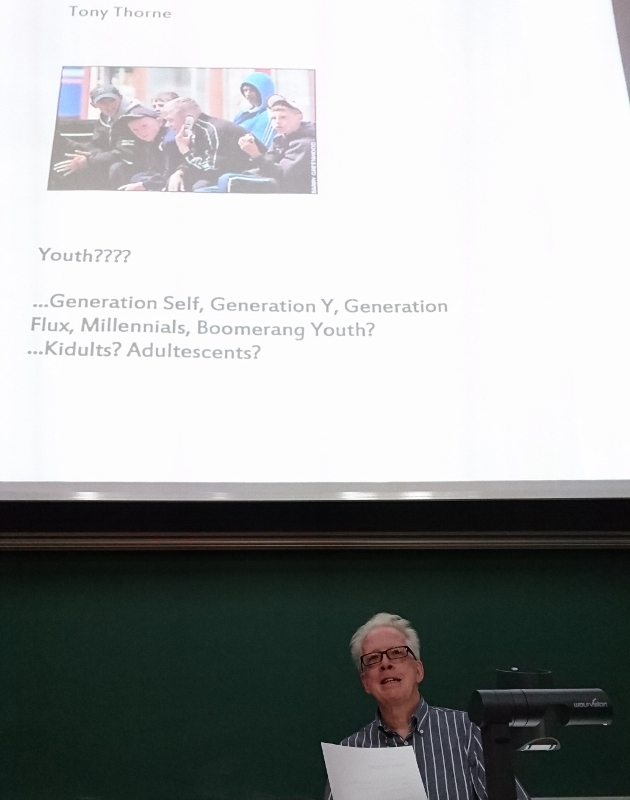“STOP PLOITERING AND GRAB THE MELLY!”
I’ve long been interested by the inventive, jokey, sometimes ludicrous expressions that arise within the family and only very occasionally emerge into the speech of the wider community. This variety is sometimes known as family slang or familect, otherwise, by the English Project at Winchester University, as kitchen-table lingo.
The following article gives some examples of these lighthearted, eccentric expressions…
PR specialist Hamish Thompson has been working on his own glossary of family language and was kind enough to send me his introduction, acknowledgements and a selection of entries:
‘Most families have an invented vocabulary – the words that grow out of mishearing, misspelling, kids’ early attempts at talking or things that you might have seen that have become folkloric.
One of my kids coined the term ‘argubating’, which means arguing a point in a self-indulgent, unproductive way. We also have ‘wookthack’, which for complicated reasons means ‘a rucksack from Derbyshire’.
And then there’s ‘scrapey’, which is a disappointing texture, named for the moment that my daughter, aged about 5, jumped the fence at the Postman Pat Village at Longleat to touch Mrs Goggins’ hair.
I asked people on Facebook last week whether they had any words that were part of their family vocabulary and I got some lovely responses.
I like the idea of a new dictionary, which I’m going to call ‘Famguage’ (thanks Alex Johnson). I heard my son talking to his girlfriend about some of our words the other day. Clanguage is something that you’re eventually introduced to when you really enter a family.
I’d love to hear yours and add them to this list. Tweet me at @HamishMThompson or email me at hthompson@houstonpr.co.uk and I’ll add them here. Acknowledgements below.’
Alligator – a moving staircase.
Angipodes – crawly insect
Apogetic – opposite of energetic
Argubating – self indulgent row
Bantry – basement pantry
Bisgusting – poor personal habits
Bishee bishee Barnarbee – ladybird
Bleenger – someone who keeps losing something
Bonger – TV remote control)
Boop and bamwhiches – nutritious lunch
Cake Out – a stake out with bought cakes
Calm chowder – popular meal for kids in New England
Cat-flap – have a big panic or over fussy reaction to something
Chish and fips – Fish and Chips
Cluckston – generic term for chicken, hen, rooster, cockrell etc. “It’s some kind of cluckston.” See also, crucially, ‘Quackston’
Complify – opposite of simplify
Daddy’s soda – beer
Dinger- TV remote control
Embuggery – embroidery
Fi (pronounced like hi) plural of foxes
Forgettabox. Floatycoat. Windy man (fart)
Goggy for the favorite blankets the boys used when they were little.
Graunch – the scraping of furniture on a wooden floor when moving it improperly.
Gruncle and Graunt – great uncle and aunt
Gruntled – happy
Hairochopter – helicopter
Hangry – annoyed because of lack of food.
’Have you forgotten how to English?’
Iforloafer – falling over
In a little minute – buying a bit more time before bed
Industriocity – busy / va va voom “hoy lad, it’s time you showed a bit of industriocity”
Marshmellons – soft sweet
Merangutans – Meringues
Miseratating – so constantly miserable you are irritating
Nicknames – Lewie, Boogle, Doodie, Moomin
Nommelin – omelette
Nonk – milk
On the roof – imminent danger
Ploitering about – piddling about and loitering
Pokey pola – Coca-cola
Quackston – a duck (see also ‘cluckston’)
Scrapey – unpleasant texture (after jumping the fence at the Longleat Postman Pat Village to touch Mrs Goggins’ hair)
Sidey the table – sit around the table for dinner
Sluggerbaths – kids that dawdle in the bath until the water gets cold
Smaggy – horrible
Spudy – a spare bedroom that doubles as a study
Stinging lentils – weeds to be avoided
Swimpamool – the place you go for a swim in the summer
Tahairnairhair – proximity of a friend called Tahir
The Feli – two Felixes – my son and his best friend
The Ho Ho Hos – the seven dwarves
Till donk – the thing supermarkets use to separate your shopping from another customer on the conveyor at the register.
Tootles – toilets
Tryer trick – trousers falling down to a point that makes walking difficult
Veggybubbles – veg
Voulez-vous – vol au vent.
Wice – wood lice
Wish dosher – a machine for cleaning crockery
Wookthack – rucksack from Derbyshire
“Yes then!” – exclamation when receiving good news or when a cunning plan is formed
Yippers – indoor footwear
With thanks (so far) to: Kellie Evans, Nicola Texeira, Tamzin Benjamin, Shaun Andrews, David Johnson, Clare Corbet, Vanessa Potts, Michael Cullen, Nick Higham, Michael Moran, Rene Wright, Lynne Clark, Cam Ross, Steve Dring, Alex Johnson, Dawn Murray, Chris Winstanley, Helen Hobbs, Jean Harbilas, Tracey Holmes-Reynolds, Elizabeth Varley, Jenny Hodge, Caroline Lavelle, Andy Ravenscroft, Vivien Patterson, Sharon Rasker, Leroy Bingham, Alex Thomson, Donal McCabe, Duncan Wisbey, Gina Jones, Jim Boulden, Joanna Oliver, Peppi Wilson, Mark Webb, Susanna Voyle, MoiOfRa, Jane Symons, Tyler Massie, Rebecca McKie, Dr Decadence Marple.
More from 2013 in the Guardian…
https://www.theguardian.com/media/mind-your-language/2013/jul/19/mind-your-language-family-slang
…and January 2018, an excellent article that includes personal reflections by Caroline Baum also in the Guardian newspaper…
In August 2020 the BBC appealed for examples of family-only expressions. They received a good response on Twitter…










